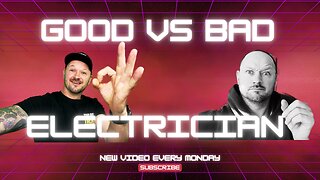Should I Work on Live Service Conductors? My Boss says YES!
Should we be working Live Service Conductors? In the latest episode of Electrician U, Dustin turns to a follower’s question “My boss refuses to turn off utility lines for any reason. Am I out of line for refusing to work live service conductors”?
🤘⚡️MEMBERSHIP⚡️🤘
JOIN ELECTRICIAN U - become a member and get:
FREE Continuing Education every year
FREE Practice Exams
FREE Monthly Video Courses
FREE Weekly Live Instructor-Led Classes
FREE Monthly Educational Newsletter
Premium Members-Only Content
Private Discord Channel
Monthly Members-Only Discord Chats
Sign up here --- https://www.electricianu.com/electrician-u-membership/
🎧🎹MUSIC AND VIDEO:🎹🎧
https://www.facebook.com/descantmv
🎬✍️ART AND ILLUSTRATION:✍️🎬
https://www.daverussoart.com
First, as talked about in other videos from Dustin, lets understand how electricity works. To summarize, electricity needs to make a complete loop to do its thing. So, out on the hot and returning on the neutral (or another hot if other than a single pole circuit). When you touch the hot wire to anything else; a ground wire, something that is grounded, a neutral wire, or another hot wire, you WILL get an arc blast! And if you are holding onto a hot wire and are touching something that is grounded, a neutral wire, or another hot wire, you WILL get shocked as you are allowing a completed path for everything to return to its source as it is intended. This can result in a wicked shock, temporary or permanent damage to your body, or death!
Which leads us to the next point and the crux of the question itself. You should NEVER attempt to work on live circuitry if YOU are not comfortable with doing so or if you don’t understand WHAT the risks are. You are the one who is ultimately responsible for your own safety. Not to say that others aren’t at fault for putting you in an unsafe situation, but you are the only one who can say NO. So, if your boss is refusing to have you work on something de energized, has not provided you the appropriate training, and hasn’t provided you the appropriate PPE, then you are well within your rights to decline to work on it. As electricians, we should turn power off to a circuit before attempting to work on it. There are a few instances where we cannot including, but not limited to, troubleshooting (as power generally needs to be on if we are trying to figure out why something isn’t working), greater risk to property/human life (say in a hospital on a critical power circuit that a patient is hooked up to), taking voltage/amperage readings, etc. But in these instances, the electrician should be trained on recognizing the risks, how to mitigate them as much as possible, issued the proper PPE to accomplish the task, and EVERYONE involved to sign off on what is being done and accepting the risks involved.
The PPE will vary dependent on the voltage and situation. The PPE can range from hot work gloves to full flash suits rated to 40 calories. The NFPA 70E is a great source for referencing what type of PPE is required to work in an energized situation.
Something else to consider is taking information from peers, other electricians, or supervisors. Again, it is up to you to determine your comfort level, and the folks you are asking questions to may not understand the specific situation you are looking at. From a training level, you should be provided all that you need to know regarding energized work AND have AT LEAST a few years in the trade to understand not only HOW electricity works but also the risks involved with working on it energized. A new apprentice should NEVER be put in a situation where they are forced or even asked to work on something hot!
We hope this has been insightful in helping you understand some of the risks involved with working on energized circuits and how to approach a situation where being asked to work on it energized. Is there a topic you would like to see discussed? Leave a comment in the comments section below and let us know. Please continue to follow Dustin and Electrician U as we are constantly adding new content to help our followers become the best electricians they can be!
-
 10:19
10:19
Electrician U
1 year agoBEST OF CODE TIME 3: Feeder & Service Entrance Conductor, Mechanical Execution of Work & Panelboards
90 -
 7:13
7:13
Electrician U
1 year agoOn The Job: Grounding The Slab
300 -
 16:49
16:49
Tool Box Talk For Electricians
5 months agoWhat is the Difference Between Good And Bad Electricians
28 -
 3:19
3:19
Tool Box Talk For Electricians
7 months agoWhat other jobs can you do as an electrician? The skills you have #electrician #businessidea
11 -
 29:19
29:19
Tool Box Talk For Electricians
1 year agoDifferent Customers In Domestic, Commercial And Industrial Jobs - Working As An Electrician
91 -
 1:35
1:35
Larson Electronics - American Made and Manufactured Industrial Lighting and UVC Products
2 years agoHot Work Permit Cords Make Temporary Jobs Safer and Faster
29 -
 1:10
1:10
The Online Consultant
2 years agoDo we work on live power? - Virtual Electrician - Electrician near me
58 -
 24:15
24:15
Tool Box Talk For Electricians
1 year agoHow Much Does It Cost To Work As A Self Employed Electrician?
21 -
 16:36
16:36
Tool Box Talk For Electricians
7 months agoScam Qualifications To Become an Electrician FAST! 😲
45 -
 18:06
18:06
Tool Box Talk For Electricians
4 months agoTools of the Trade: Must-Have Equipment for Independent Electricians
36